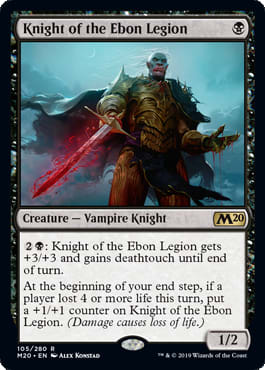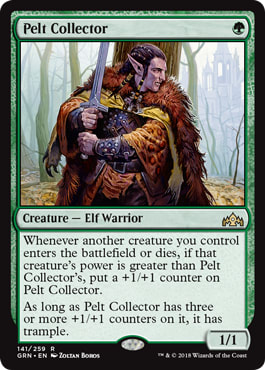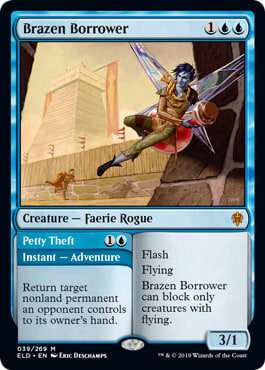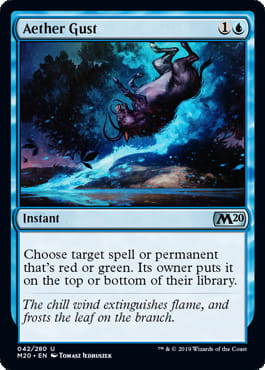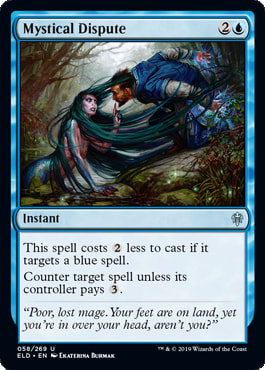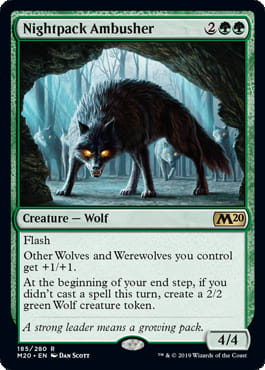It has been a week since Brad Nelson, Seth Manfield, and Javier Dominguez all made the Top 8 of MC7 with a deck that mashed together the best parts of Simic Flash and Simic Ramp. Before that dominating performance, the decks were clearly divided into separate archetypes. Simic Ramp tried to exploit Nissa, Who Shakes the World and Hydroid Krasis while Simic Flash tried to use Nightpack Ambusher to summon a wolf pack while using countermagic to prevent the opponent from resolving anything useful. When Oko, Thief of Crowns, Once Upon a Time, and Veil of Summer were banned, both decks were assumed to be weaker. They became stronger by merging into what I call Simic Hybrid.
Simic Hybrid | Eldraine Standard | Brad Nelson, MC7
- Creatures (15)
- 2 Brazen Borrower
- 2 Hydroid Krasis
- 3 Paradise Druid
- 4 Frilled Mystic
- 4 Nightpack Ambusher
- Planeswalkers (4)
- 4 Nissa, Who Shakes the World
- Instants (15)
- 1 Negate
- 2 Aether Gust
- 2 Mystical Dispute
- 3 Quench
- 3 Sinister Sabotage
- 4 Growth Spiral
- Lands (26)
- 7 Forest
- 7 Island
- 2 Castle Vantress
- 2 Fabled Passage
- 4 Breeding Pool
- 4 Temple of Mystery
This is actually a combo deck. The combo is Nissa, Who Shakes the World or Nightpack Ambusher and a counterspell. Every turn that either of these key cards sticks to the board is a turn that the controller is closer to victory. Growth Spiral and Paradise Druid help you resolve your key cards ahead of schedule and neither one can be hit by removal.
If you want to learn a lot about Simic Hybrid for competitive best-of-three (BO3) play you should find articles or watch streams with the players who ran the deck. I won't presume to have better things to say then they do. That said, I apply myself competitively to a different type of Magic; best-of-one (BO1) MTG Arena ranked ladder and Standard Events. In the last week I have been amazed by how many people play Simic Hybrid in best-of-one as a card-for-card copy of the deck from MC7. BO1 is a format from BO3 for a number of reasons (that could be an article someday), and the MTG Arena ladder is a completely different metagame from the Mythic Championships.
My two key differentiations between BO1 play and BO3 play are:
- Aggro will always be more popular than midrange, control, or combo.
- The BO1 meta will have more variety than the BO3 meta.
Adapting to more Aggro
You will see more Mono-Red, Gruul, and Rakdos aggro decks in one day of Gold rank best-of-one play than you will see in an entire MC weekend. If Simic Flash has a serious weakness, it is strong 1-drop creatures. Simic Hybrid is better against these aggro strategies because it doesn't have to counter everything to win, and ramping into Nissa, Who Shakes the World and Nightpack Ambusher can overpower the cheap threats if you don't die early. If you are overloaded on counterspells, these cheap creatures will beat you to death before you reach that stage of the game. In BO1 you have to be able to win some games on the draw, therefore you can't leave yourself drawing dead to an aggressive 1-drop, 2-drop, 3-drop curve. For Simic Hybrid this means less counterspells and more early interaction with the board.
Unsummon and Brazen Borrower are strong tempo plays that buy you time. In a control strategy this wouldn't pay off because Unsummon costs you a card, and buying time to fall behind on cards isn't a winning strategy for a control mage. For Simic Hybrid you are buying time and falling behind on cards early, but you make it up in the midgame with Nissa, Who Shakes the World, Nightpack Ambusher, and Hydroid Krasis. This deck is great at tempo games, and I often kill my opponent with seven cards in their hand while my hand is empty because I close games quickly. Neither Unsummon nor Brazen Borrower are dead against creatureless decks. Unsummon can be another Frilled Mystic or Hydroid Krasis trigger, while Brazen Borrower should go straight into beatdown mode if you don't have a Petty Theft target.
Adapting to a Diverse Meta
Aether Gust and Mystical Dispute should be a part of this deck's plan in competitive BO3, without question. The cost is so low! You can sideboard them out on the off-chance you play a matchup where they are bad, and most of the matchups you play have targets for Aether Gust. Mystical Dispute's fail-state is often an easier-to-cast Cancel, so it is never that bad.
In BO1 play these cards will punish you. Mono-Black Sacrifice, Orzhov Doom Foretold lists, and all kinds of matchups you don't expect will leave you down a card. You should find replacements for these color-specific spells that work against every deck to some extent. To take it a step further, consider trimming Negate. You will lose every game where the opponent plays creature, creature, creature and you are holding two copies of Negate. While I appreciate and respect main decking color specific spells in BO3, it is not a winning strategy against the weirdness that can be the BO1 meta.
Taking these two key differentiating factors into consideration, here is my Simic Hybrid list for BO1 ladder play.
Simic Hybrid | BO1 Standard | CGB 12-15-2019
- Creatures (16)
- 2 Hydroid Krasis
- 2 Paradise Druid
- 4 Brazen Borrower
- 4 Frilled Mystic
- 4 Nightpack Ambusher
- Planeswalkers (4)
- 4 Nissa, Who Shakes the World
- Instants (14)
- 1 Negate
- 2 Sinister Sabotage
- 3 Unsummon
- 4 Growth Spiral
- 4 Quench
- Lands (26)
- 6 Island
- 8 Forest
- 2 Castle Vantress
- 2 Fabled Passage
- 4 Breeding Pool
- 4 Temple of Mystery
Cutting a Negate for the 4th Quench keeps you out of spots where your counterspell lacks a target. BO1 games are compressed into the first few turns, and the typical game length is around eight minutes. You need to counter something that matters early, and that makes Quench a much stronger BO1 card than a BO3 card.
Don't be afraid to fire off your Unsummons and Petty Thefts on anything with two-or-more power or two-or-more CMC early. For example, bounce a Gutterbones, don't bother bouncing a Cauldron Familiar. Your goal is to resolve a Nightpack Ambusher or Nissa, Who Shakes the World and have a counterspell available. From that position you will win most games.
It is turn four, you have Nightpack Ambusher in hand and four mana available, two of which are Green. Your Golgari opponent has a Cauldron Familiar, a Trail of Crumbs, and three untapped mana, two of which are Black. It is your opponent's end step. Do you cast Nightpack Ambusher?
Casual MTG Arena player: Yes, because it is the most expensive card for the mana that lights up in my hand, and it is because it is the flashiest play (get it?).
Big Brain MTG Arena player: No, because the opponent could have Murderous Rider or some other removal spell and I want to wait until I can protect my Nightpack Ambusher. The opponent isn't doing much anyways.
Galaxy Brain MTG Arena player: It depends on the rest of your hand. See, it was a trick, I didn't give you enough information to make the right choice.
If your hand has Unsummon and another land you can wait one turn and have a way to defend your Nightpack Ambusher, so you should wait. If your hand has Quench, than in two turns the opponent could pay for the Quench anyway, and perhaps you should cast the wolf because Trail of Crumbs makes finding a Murderous Rider more likely as time goes one, and it makes Quench less likely to counter it.
What if you don't have Frilled Mystic or Sinister Sabotage, but you do have Nissa, Who Shakes the World, Hydroid Krasis, and Negate and you control a Breeding Pool? Casting the Nightpack Ambusher may be met with a Swift End, but then you get to play Nissa, Who Shakes the World, animate the Breeding Pool, have Negate open for a potential second copy of Swift End, and you follow it all up with a massive Hydroid Krasis. Send the wolf out there to die!
I write about all this because a consistent theme of my YouTube channel has been Simic Flash players sending their Nightpack Ambushers to their meaningless deaths because they confuse keyword Flash with keyword Hexproof. Just because you play it in my end step doesn't mean I cannot counter it or kill it. Decks with Flash creatures and counterspells offer a ton of possibilities to the pilot, make sure you take advantage of this and explore all your options. Then you will live a fun, healthy, victorious Flash gamer life. But don't expect to make many friends.

















